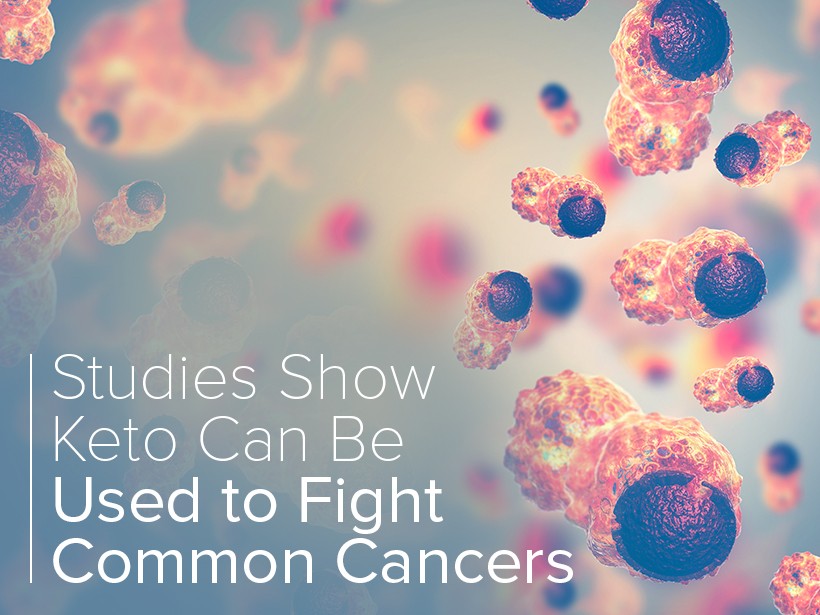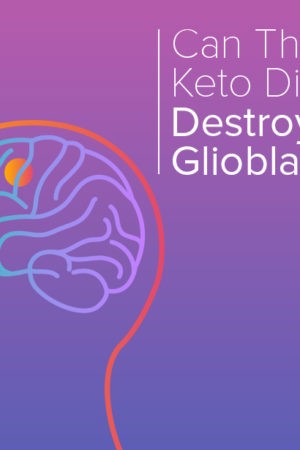Cancer is one of the most invested areas of research in the world, yet no widely accepted cure has been discovered. Even the therapies that exist are flawed in some way, whether that is in the heavy price tag or the limited success rates. Well, it’s time to think outside of the box. Below are 5 of the most common forms of cancer and their associated responses to a ketogenic diet as a therapy.
Glioma
A glioma is essentially brain cancer which is typically treated with neurosurgery, radiation therapy, and chemotherapy with survival expectancies ranging from 8 to 15 months.1 More recently, the ketogenic diet has been suggested as a possible therapy.
The idea was based on the fact that brain cells can use ketones for energy instead of glucose. Tumors require glucose for energy because they don’t have the enzymes needed to break down ketones. The result of getting on keto is that you essentially starve cancer; while this doesn’t cure it, it can slow or stop the cancer from growing.
Neuroblastoma
A neuroblastoma is very common in children; treatment typically includes chemotherapy, radiation therapy, surgery, and in some cases, stem cell therapy.2 Like gliomas, neuroblastomas are highly dependent on glucose.
The idea behind a ketogenic treatment for neuroblastomas is that tumor cells that are exposed to a ketogenic diet must obtain energy through the breakdown of fatty acids for energy production, and that’s something these cells aren’t very good at doing. This stresses the neuroblastoma cells out and puts them in an unfavorable environment.
Thyroid Cancer
Thyroid cancer is reportedly the most common form of endocrine tumor out there with a common prognosis of a 5-year survival rate.3 It’s typically treated with high doses of radioactive iodine. However, new research demonstrates that these cancers can be treated with the ketogenic diet. The idea behind this therapy is based on something called the Warburg effect: a metabolic shift in cancer cells in which glucose is highly demanded. If you starve the body of sugar, then the cancer cells cannot receive the energy they need to survive.
One study, in particular, studied the effectiveness of the ketogenic diet in thyroid cancer with the help of vitamin C (that good stuff in oranges) and metformin. High doses of vitamin C is deadly to colorectal cancer cells, which are also found in thyroid cancer.4
Metformin was known to the authors of the study as being really good at benefiting patients with thyroid cancer and is currently used as an effective antidiabetic drug.5 Therefore, the authors concluded that a concoction of vitamin C, metformin, and ketones would do a thyroid cancer patient good!
Prostate Cancer
Prostate cancer is linked to obesity, so a 2017 study suggested that carbohydrate restriction could benefit mice with prostate cancer which was induced by a carbohydrate-rich diet.6 Through their study, they found that mice who consumed a low carbohydrate diet without calorie restriction lost weight. They also found that in this environment, something called MCP-1 significantly decreased.
To keep it simple, MCP-1 is just a little molecule that pops up during inflammation and is associated with promoting prostate tumor survival. Well, if you caught the main point in the tangled mess of scientific terms, what these scientists found is that the ketogenic diet promoted an environment in which prostate tumor cells were not supported to survive.
Renal Cancer
Renal cancer, or cancer of the kidneys, is usually associated with hydrocephalus and epilepsy. As we already know, the ketogenic diet is thought to be particularly useful in lowering the number of seizures associated with epilepsy.
If you’re not yet convinced, keep your eyes peeled as the rise in interest in the ketogenic diet is likely to perpetuate more studies in the treatment of cancer and the success associated with it!
NUTRITIONAL DISCLAIMER
The content on this website should not be taken as medical advice and you should ALWAYS consult with your doctor before starting any diet or exercise program. We provide nutritional data for our recipes as a courtesy to our readers. We use Total Keto Diet app software to calculate the nutrition and we remove fiber and sugar alcohols, like erythritol, from the total carbohydrate count to get to the net carb count, as they do not affect your blood glucose levels. You should independently calculate nutritional information on your own and not rely on our data. The website or content herein is not intended to cure, prevent, diagnose or treat any disease. This website shall not be liable for adverse reactions or any other outcome resulting from the use of recipes or recommendations on the Website or actions you take as a result. Any action you take is strictly at your own risk.
- Research Shows Improvement in Anorexia Nervosa Condition With Keto - August 6, 2018
- New Potential for Ketogenic Diet to Prevent Alcohol Withdrawal Syndrome - August 1, 2018
- Woman on Early Menopause Saved By Keto - July 25, 2018




